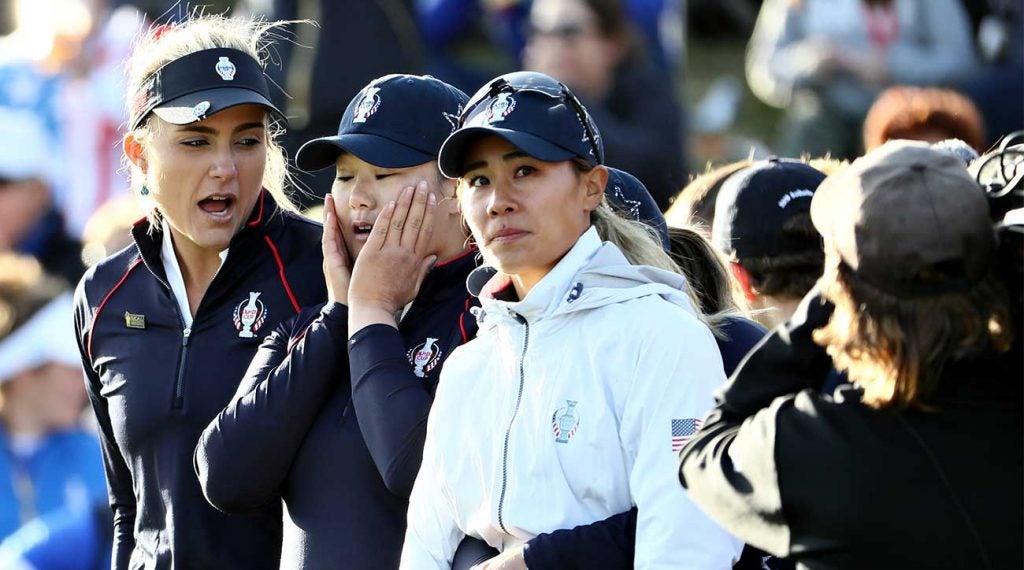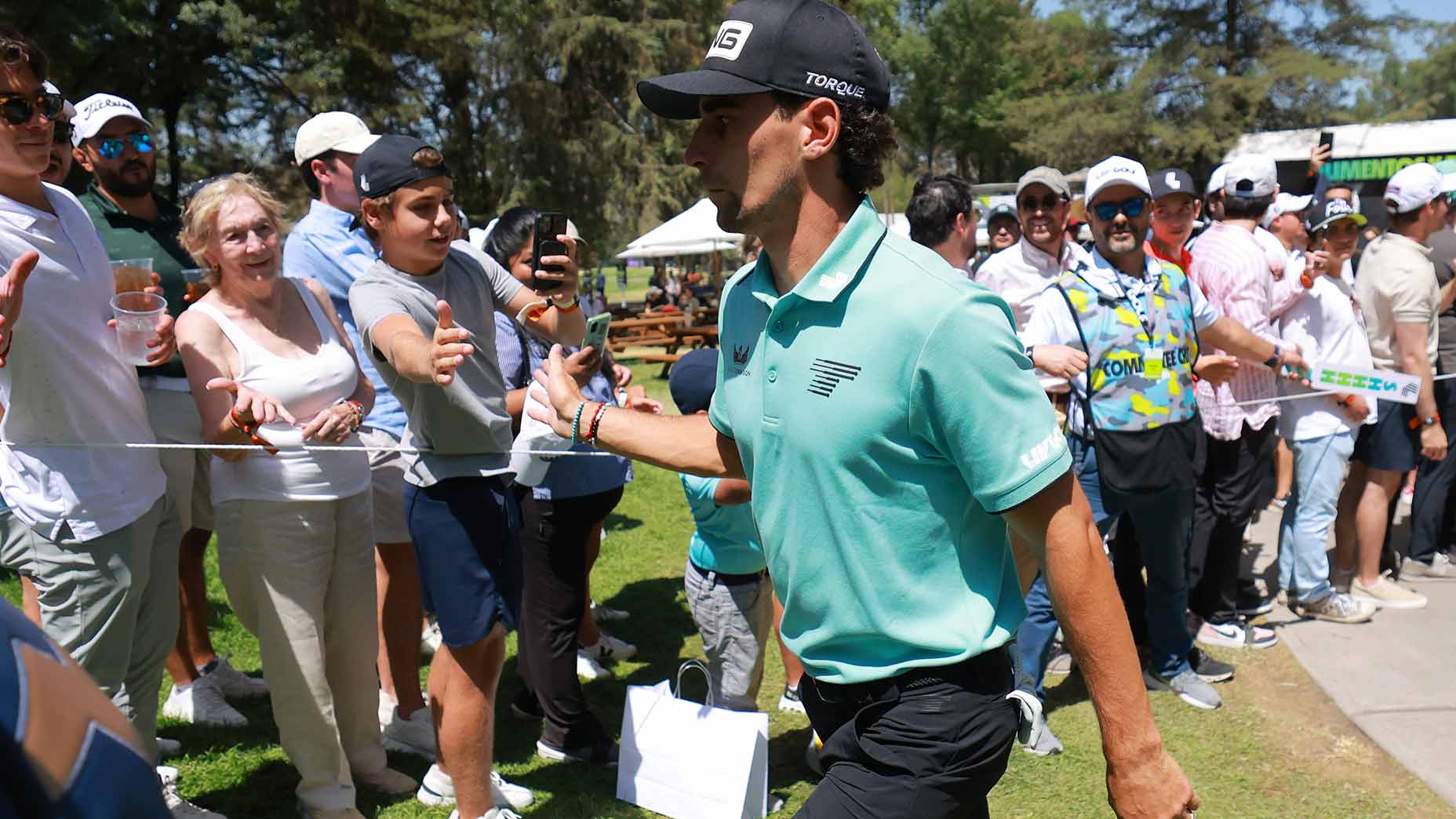 Inside LIV Golf’s exclusive new Mexico City ‘Team Villas’
Inside LIV Golf’s exclusive new Mexico City ‘Team Villas’
Tour Confidential: What went wrong for the U.S. Solheim Cup team?
Check in every Sunday night for the unfiltered opinions of our writers and editors as they break down the hottest topics in the sport, and join the conversation by tweeting us @golf_com. This week we discuss the 2019 Solheim Cup, including what went wrong for the U.S. squad, the PGA Tour’s Player of the Year vote and more.
1. Tied 8-8 heading into Sunday singles at the Solheim Cup, Europe charged late and clinched its victory with a Suzann Pettersen birdie on the 18th hole, winning the Cup in dramatic come-from-behind fashion, 14.5-13.5. It was just the sixth win for Europe in 16 meetings and the first since 2013. What went wrong for the Americans, who were heavily favored heading into the matches?
Sean Zak, senior editor (@Sean_Zak): I can’t really look to anything besides that second-to-last match, when Bronte Law took over. It felt like that was an American point for much of the day, and then she made some incredible birdies late — three of her last four holes — suffocating a point for the Euros. Momentum.
Michael Bamberger, senior writer: Road games are hard in these team competitions, and this was not a strong U.S. team, so it’s not a surprise. As second-guessing is a national sport in these affairs, I don’t know why you’d ever want to split up the Korda sisters.
Jonathan Wall, equipment editor (@jonathanrwall): Europe rose to the occasion. I don’t think there’s anything you can do in those situations. Sometimes it’s written in the stars.
Dylan Dethier, senior writer (@dylan_dethier): Suzann Pettersen is what went wrong for the Americans! That putt on 18 isn’t something I’ll forget soon. There were moments the U.S. team would like to have back — Danielle Kang’s 18th hole, say, or Lexi Thompson’s unfortunate back spasms. But Europe showed it was made of tougher stuff and rallied together at the end.

2. One of the great traditions of Solheim and Ryder Cups is, of course, second-guessing the captains’ decisions. Anything Juli Inkster could’ve-should’ve done differently in skippering the U.S. side?
Bamberger: Oh, now I see the second question! Please refer to the first answer. Also, you can’t go overseas too early, but there are many practical limitations at play in that.
Zak: If Inkster thinks it was going to be smart to keep the Korda sisters separate, I 100 percent trust that. That being said, it was hard to see other obvious decisions for her in the pairings, so perhaps she should have just made that obvious one. Thankfully, she doesn’t care about our second-guessing.
Wall: I like the idea of leaving a stronger player at the back in a competition when there’s a chance it’ll come down to the final few matches. No offense to Morgan Pressel, but I would’ve preferred a more in-form anchor. That’s nitpicking. Overall, I think Juli did one hell of a job on foreign soil.
Dethier: I know Danielle Kang is a gamer, wanted to go out first in singles and I definitely appreciate Inkster sending her out in that position — but it was a bit of a vulnerable spot for a player who had faced an onslaught of tabloid aggression all week. She might have felt somewhat more comfortable with Americans on either side of her Sunday. (Note: This is rampant speculation, as she easily could have won her match and the storyline would be the opposite.)
ADVERTISEMENT
3. Slow play was a major talker all week, as groups were put on the clock and one player even received a bad time (yet no player ever received a DQ from a hole). Are you OK with team exhibitions like this being played at a slower pace, or is there more (or less?) reason for them to be policed like regular Tour events?
Bamberger: I think teams would play better by playing faster. These are players not accustomed to having a lot of chit-chat analysis from playing partners, and now suddenly they do. So, yes, play faster and enforce the rules exactly as they are written.
Zak: I’m OK with four-balls taking longer (to an extent). There are inherent advantages in seeing your opponent’s result, so I understand it. Also, all that slow play came during whipping winds and tough conditions. I’m going to walk the line and remind us that it’s all relative.
Wall: I don’t have a problem with pace of play in a team competition. There are times where playing faster or slower is pure gamesmanship. I think it’s the only arena in golf where I give everyone a pass. Playing for your country is an entirely different beast.
Dethier: I was watching on Sunday and thinking how if there was something like a shot clock, it would take away from these crucial moments where players take time and tension builds, much like a closer gathering himself with the tying run on base late in a baseball game. Yeah, faster would be better, especially early on in the match. But I don’t mind the drawn-out drama later on. My position sounds difficult to legislate, though.
4. Suzann Pettersen sounded like she had made up her mind regarding her future following Sunday’s win. “I’m completely done,” she said, announcing her retirement from pro golf. Given Pettersen was less than an hour removed from draining one of the most important birdie putts of her life, was this the greatest golf retirement ever?
Bamberger: Absolutely! The only thing better would have been saying nothing and just walking away.
Zak: No doubt the greatest. She absolutely pured that putt, just a few minutes after nearly holing out with a wedge from the fairway. Chances are you’ve done that on the 18th before signing your amateur scorecard. There is no greater feeling than playing perfect golf before ending your day, and she did it on one of the biggest stages in the world! Bravo.
Wall: Of course! It’s nearly impossible to top what I’d consider to be the ultimate mic drop. The only thing that would’ve surpassed it is if Tiger had done something similar after his Masters win.
Dethier: Many of these players acknowledge that the Solheim Cup is their most meaningful event. With that in mind, a moment like that would represent the peak of most players’ careers! Very literally retiring on top. We’ll see if she stays retired, but that’s one hell of a mic drop.
5. Tiger Woods signed off on a recent Presidents Cup blog post as “Playing Captain,” which raised a few eyebrows in the golf world, although it turns out he’s been signing his name that way in his Presidents Cup blogs since April. Still, is this development nothing, or something?
Bamberger: I was not aware of the sign-off until this week. I take it literally.
Zak: I also take it literally. I think it would be a very weird look for him to do that for more than six months and then back off the decision in November.
Wall: Something. Why else would he continue to sign off that way even after the recent procedure? I still think he’s playing.
Dethier: He’s playing. But just remember how many of you had jumped off the ship after his Northern Trust WD. With Woods, we never know much — and things change fast.
6. To the surprise of some, Rory McIlroy won PGA Tour Player of the Year. McIlroy and Brooks Koepka were deemed the front-runners, but McIlroy won the player vote to win the award for the third time. Koepka has long spoken out about slow play on Tour, admits he doesn’t pay much attention to golf history and even said he doesn’t really practice for non-majors. How much, if at all, do you suppose Koepka’s candor/personality hurt him in the vote among his peers?
Bamberger: I don’t think anybody would really argue that Rory’s resume was better, but he won a big boatload of PGA Tour money and that of course is going to impress the fellas. Overwhelm them, really. I imagine that the players like Koepka — he’s a straight-shooter, not a pol, and isn’t that refreshing? — but he’s different, and different scares people. So I think that might have cost him some votes. Also, if he did vote, he likely didn’t vote for himself (per his comments to Dan Patrick last year) and that might have made the difference. #releasetheresults! I’d suggest the Tour takes its cues here from what it does every week. Those scorecards are not simply trusted to be accurate, as people so often and incorrectly say. They are vetted by the other players, the caddies, sometimes spectators. Big Brother is watching those cards! And that’s why there is broad faith in the scores, in addition to the idea of golf being a game of honor, which it is. In that spirit, it would be appropriate, and actually add to the fun of the debate, to see the results. Yes, that might lead to some embarrassment, depending on how it plays out, but one of the points of these postseason awards is to give us fans something to discuss and debate.
Zak: I suppose it had something to do with the vote. Everything? No. Rory put up a great season. But something tells me if Rory McIlroy’s 2018-19 achievements were listed next to, say, the name of Xander Schauffele, Koepka is winning POY. The bottom line here is that people love the Rors.
Wall: I’m fairly certain it played a role in the decision. The award isn’t a popularity contest. It should NEVER come down to who’s the nicer guy. It should always take into account a player’s performance in the majors — something the POY ballot curiously omitted. I think the award lost a bit of its luster this year.
Dethier: I think the way the ballot stressed PGA Tour wins and made the majors essentially equal to other Tour events had an effect. Some Tour players are aware of player resumes and tune in to our analyses week by week. Others stay far, far away and wouldn’t know much about Koepka’s year versus McIlroy’s. So framing is important, and Koepka’s snubbing of typical Tour events hurt him. I don’t think it was his candor or personality that swung the vote — it was his results, and the way they were presented. We think of the majors differently than the PGA Tour does, which is why we generally think Koepka should have won Player of the Year. Under that framework, maybe we and the Tour are both right in our own ways.
To receive GOLF’s all-new newsletters, subscribe for free here.
ADVERTISEMENT







